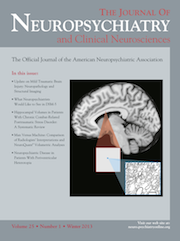Antidepressant Activity of Linezolid
To the Editor: Linezolid is an antibiotic approved for use in cases of infection by highly-resistant bacteria. It has weak activity as an inhibitor of monoamine oxidase.1 It was reported in 2001 to be associated with a case of serotonin syndrome.2 The association of linezolid with serotonin syndrome has been replicated, and it is now accepted practice to discontinue antidepressant medications when linezolid is to be used.3
It appears that the risk of depression relapse is not great. Two cases seem to show why.
“Ms. A” was an 85-year-old woman being treated for chronic obstructive pulmonary disease, osteoporosis, osteoarthritis, hypertension, and coronary artery disease, and was treated for depression with escitalopram 20 mg daily. She felt ill one morning, and did not eat breakfast. Medical evaluation found that she was confused, hypotensive, and tachycardic, although there was no fever. She was evaluated and admitted at a hospital associated with her nursing home, and was treated for a urinary tract infection (UTI) with sepsis causing symptoms of shock. Cultures of both urine and blood demonstrated Enterococcus faecalis, which was resistant to most antibiotics. She was treated with linezolid. All of her other medications had already been discontinued. As she recovered, she returned to the nursing home. I met her a day or two later. She was not experiencing depressed mood; her sleep was normal, and she was reassured that her antidepressant could be restarted 2 weeks after she finished taking the antibiotic. I happened to visit her about 3 days after she stopped taking linezolid, and she was then beginning to experience some depressed mood, tearfulness, and earlier waking from sleep. She was reassured that she could start taking escitalopram in another 11 days. Seen 2 weeks later, she reported her depressed mood persisted until after the antidepressant was restarted. The patient did not experience another relapse of depression, but later died after a myocardial infarction.
“Ms. B” was an 82-year-old woman who was treated for depression with escitalopram. Comorbid illnesses included Parkinson’s disease, chronic obstructive pulmonary disease, Alzheimer’s disease, hypertension, type II diabetes mellitus, and coronary artery disease. She had already been treated for a UTI that was caused by a methicillin-resistant Staphylococcus aureus. The infection recurred, with symptoms of painful dysuria, urinary frequency, and lassitude. Intravenous vancomycin was started; urinalysis confirmed the diagnosis, and urine cultures confirmed the responsible organism was again S. aureus, but this isolate was also resistant to vancomycin. The consultant prescribed linezolid, and escitalopram was discontinued. The patient’s lassitude worsened until about the third day of antibiotics, and then improved slowly. She did not experience a recurrence of signs of depression until the day after linezolid therapy was discontinued. I was called in to see her after her second day of not eating and believed she was experiencing relapse of her depression. These symptoms remitted 2 weeks later, when escitalopram was reinstituted. The patient later expired after a stroke.
Linezolid is not the first antibiotic to have been noted to have activity as an inhibitor of monoamine oxidase (MAO).4,5 Iproniazid was noted to have antidepressant activity soon after its release as an antitubercular agent.4
The timing of the relapse of depressive symptoms in both the patients described, after the discontinuation of linezolid but not after the discontinuation of the SSRI antidepressant, also suggests that linezolid is indeed an effective antidepressant drug.
1 : Linezolid. Drugs 2000; 59:815–827, discussion 828Crossref, Medline, Google Scholar
2 : Linezolid and serotonin syndrome. Psychosomatics 2001; 42:432–434Crossref, Medline, Google Scholar
3
4 : Interaction of monoamine oxidase inhibitors with physiological and biochemical mechanisms in brain. Ann N Y Acad Sci 1959; 80:609–616Crossref, Medline, Google Scholar
5 : Towards rational therapy with monoamine oxidase inhibitors. Br J Psychiatry 1976; 128:354–360Crossref, Medline, Google Scholar



